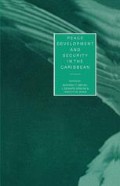Abstract
The origins of the 1985 Commonwealth Report Vulnerability: Small States in the Global Society 1 lay in the political crisis in the Caribbean in late-1983 which centred around the intervention in Grenada. These events made the heads of government ‘acutely aware of the peculiar vulnerability of small states’ and thus they called for a‘study of the special needs of small states including their security needs’.2 But this was not the beginning of the Commonwealth’s concern with ‘small states’ as, since the 1979 Heads of Government Meeting in Lusaka, the Secretariat has been mandated to have a special programme to assist ‘small, specially disadvantaged and island developing states’.
Access this chapter
Tax calculation will be finalised at checkout
Purchases are for personal use only
Preview
Unable to display preview. Download preview PDF.
Notes
Vulnerability: Small States in the Global Society, London: (Commonwealth Secretariat. 1985).
Foreword to the Vulnerability report by the Commonwealth secretary-general, page v.
Status and Problems of Very Small States and Territories, (New York: UNITAR, 1969).
Of 44 independent states with populations of around one million or less, 29 are Commonwealth members. 15 of the 29 have populations under 200,000 and seven (micro-states) are with populations of 100,000 or less. 21 are islands.
An exception for many small states would be the UN mission. The UN is such a lively diplomatic arena that participants need to be up-to-date on information and within the constraints of the very small mission, the effort is often earnestly made.
The Commonwealth secretariat itself produces, for instance, two publications which are designed particularly to help small countries - Capital Markets Review and International Development Policies_
It is regrettable that it tends to be only a few ‘left’ or ‘radical’ parties and groups which seriously make the point in public that Central American issues are near enough to be of our neighbourly concern.
Vulnerability, p. 48.
Vulnerability, p. 49.
Lloyd Searwar, ‘Proposals for Policy Research’, unpublished paper, 1986, p. 63.
Vulnerability, p. 48.
Vulnerability, p. 49.
Vulnerability, p. 48.
Vulnerability, p. 49.
Vulnerability, p. 50. Of crucial importance to small states are high levels of information on multinationals, parastatals, off-shore banking units, foreign exchange movements and other major financial flows of both individual and corporations.
Vulnerability, p. 51.
A. McIntyre, ‘The Caribbean After Grenada’, Institute of International Relations, 1984.
T. Maniruzzaman, The Security of Small States in the Third World, (Canberra: Australian National University 1982) p. 16.
Vulnerability, p. 73.
Vulnerabilit, p. 75.
The UN missions of Pacific small states share a common facility in New York, which is financed by Australia but administered by the Commonwealth secretariat. At the 1985 Nassau Summit, heads of government agreed to expand this facility to accommodate other small states desirous of utilising it. It is significant that in the last year Papua New Guinea, which had a substantial independent mission, reduced it and moved into the very modest Commonwealth facility while Dominica closed down both its UN and Washington missions. The case for regional facilities in the very expensive business of diplomatic representation is clear.
Vulnerability, p. 72.
Both Australia and New Zealand in their concern to limit Soviet presence have in recent years given increased assistance to Tonga, Western Samoa and Cook Islands to dissuade them from granting fisheries access to the USSR. The Times (London), 11 August 1986.
R. Rothstein, Alliances and Small Powers, (New York: Columbia University Press, 1968) p. 117.
Vulnerability, p. 43.
Vulnerability, p. 105.
Vulnerability, p. 44. The cited case is Malta which among other steps established bilateral security arrangements with Libya (1970) and in an exchange of notes with Italy in 1981 declared itself as having a neutral status.
There has been some consideration of establishing a regional policyplanning institute. Quite apart from this, as the author advocated in an internal paper in the institute in 1978, the Institute of International Relations should be heavily involved in policy studies.
Even these national meetings are becoming distressingly rare for some states on the grounds of the cost.
Editor information
Editors and Affiliations
Copyright information
© 1990 Anthony T. Bryan, J. Edward Greene and Timothy M. Shaw
About this chapter
Cite this chapter
Linton, N.O. (1990). International, National and Regional Initiatives to Enhance Security Through Exchange of Information and Diplomacy — The Commonwealth Report Revisited. In: Bryan, A.T., Greene, J.E., Shaw, T.M. (eds) Peace, Development and Security in the Caribbean. Palgrave Macmillan, London. https://doi.org/10.1007/978-1-349-10244-0_13
Download citation
DOI: https://doi.org/10.1007/978-1-349-10244-0_13
Publisher Name: Palgrave Macmillan, London
Print ISBN: 978-1-349-10246-4
Online ISBN: 978-1-349-10244-0
eBook Packages: Palgrave Economics & Finance CollectionEconomics and Finance (R0)

